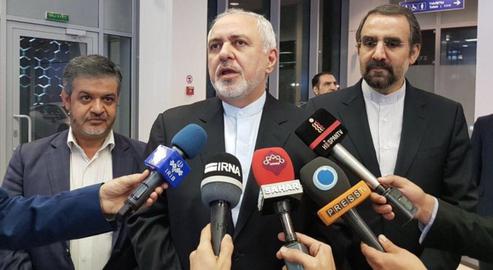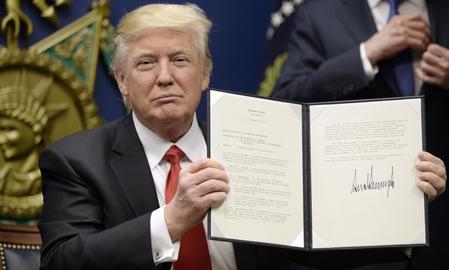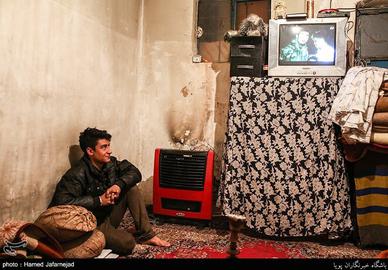On May 8, 2019, Iran suspended parts of its commitments under the 2015 nuclear deal, or the Joint Comprehensive Plan of Action (JCPOA). A year on from President Trump's announcement that the United States was pulling out of the deal, President Rouhani announced that Iran would no longer agree to limits on its sale of surplus enriched uranium and heavy water, which were included in the JCPOA in order to prevent Iran from obtaining the capability of making nuclear weapons.
The Iranian president also threatened to resume production of more-highly-enriched uranium in 60 days if France, Germany, the United Kingdom, Russia and China did not act to protect Iran from US sanctions.
President Rouhani said that the partial suspension of Tehran’s commitments under the JCPOA would be “a new step within the framework of the JCPOA,” emphasizing that the Islamic Republic did not intend to leave the nuclear deal. Nevertheless, Iran’s new decision has cast serious doubts on the future of the agreement. In particular, many analysts are wondering whether it is realistic to believe Iran can remain in the JCPOA when the US government is progressively preventing other countries from trading with the Islamic Republic.
The EU Interpretation of Iran’s Move
Immediately after Iran announced its new decision, the EU, the UK, France and Germany said they will "reject any ultimatums" from Tehran, emphasizing that this would prevent the JCPOA’s collapse. The European powers added that they regard Iran's move "with great concern", as they had expected the Islamic Republic to remain committed to the Iran nuclear deal. However, German, French and British foreign ministers planned a meeting in Brussels to find ways to keep the JCPOA alive after Iran's partial withdrawal.
Following on from the May 8 announcement and the EU’s rejection of the Iranian ultimatum, many Iran-based journalists have pessimistically questioned what will really happen if Tehran’s decision does not bring about any important change. Some of them have suggested that if, after the 60-day deadline, Iran is not awarded substantial concessions, it will be extremely difficult for the Iranian government to step down from its previously-declared ultimatum. At the same time, it might be very costly for the Islamic Republic to carry out its declared threat, i.e. to further escalate its enrichment activities.
Under such circumstances, a number of Iranian media outlets that support the JCPOA have begun to speculate on a scenario that looked unthinkable in the past: the possibility that Iran will leave the nuclear agreement.
The point is that should the ultimatum be in vain, the Rouhani administration will face two devastating options. If the government commits itself to the ultimatum, Iran will be at the risk of being expelled from the JCPOA, which will probably lead the EU to scrap the nuclear agreement altogether and avoid further tension with the Trump administration. But if the Rouhani administration retreats from the ultimatum, this move will destroy the government’s credibility. On a larger scale, if the Iranian regime retreats from the announced ultimatum, possibly none of its ultimatums (at least non-military ones) will be taken seriously in future.
The FATF Issue
It must be borne in mind that, even before Iran’s ultimatum, there was uncertainty about the feasibility of Iran remaining in the JCPOA long term.
This uncertainty was especially palpable when the Paris-based Financial Action Task Force (FATF) demanded that Iran modify its laws to guard against money laundering and the financing of terrorism. If Iran fails to comply with FATF demands, this European watchdog will blacklist the country, severely restricting its ability to engage in banking transactions with the rest of the world. Being blacklisted means that Iran, regardless of US sanctions, could possibly lose its last chances to benefit from the JCPOA’s financial provisions.
Iran’s compliance with the FATF demands requires the finalization of anti-money laundering and anti-terror financing laws in Iran. The Iranian parliament has approved the FATF-related bills but the Guardian Council, which must ratify all parliament bills, has rejected them. The final decision on the FATF-related bills is up to the Expediency Discernment Council, an Iranian high council that acts as an arbitrary body when the parliament and the Guardian Council cannot reach agreements on disputed legislation. However, over the course of the last year, the Expediency Discernment Council has failed to decide on the disputed anti-money laundering and anti-terror financing bills, as the majority of the council members are pessimistic when it comes to determining the usefulness of the bills in facilitating the country’s financial transactions.
It is worth noting that since the Trump administration put the Revolutionary Guards on the US list of terrorist organizations, Iran’s opportunities for trading with the outside world have significantly decreased, mainly due to countries and businesses being fearful that dealing with Tehran could jeopardize their own investments and financial stability. Blacklisting the Revolutionary Guards as a terrorist organization has further decreased the possibility that the anti-money laundering and anti-terror financing bills will gain approval in Iran.
A review of Iranian media indicates that since the announcement of the new US decision, not only the hardliners, but also many of the so-called moderates, are quite skeptical of European countries' ability to neutralize US pressure, which would make the approval of the FATF-related legislations irrelevant. Those skeptics emphasize that when the EU has no power to help Iran make financial transactions with foreign entities, why should Iranians pass new anti-money laundering laws in order to facilitate the tracking of their own financial transactions?
Working with Europe or Bypassing the Sanctions?
Many Iranian officials and analysts appear to have been convinced that the only way for the Islamic Republic to have access to financial resources is to bypass the sanctions, rather than to capitalize on Europe. They conclude that if the FTAF-related bills are finalized, there is no guarantee that Iran would be in a position to take advantage of the JCPOA’s financial provisions with the help of European powers, or even that the Islamic Republic would not face new difficulties in having access to its remaining petroleum revenues.
On the other hand, it is hard to imagine that in the absence of the FATF-related laws, Europe will be willing to carry out more financial and economic cooperation with Iran. In the latter case, there is also little chance that the Special Purpose Vehicle (SPV), the European initiative aimed at facilitating trade with Iran, could help Tehran take advantage of the JCPOA. The SPV was established by Germany, France and Britain on January 31, 2019 with the purpose of helping Iran make legitimate transactions with foreign entities after President Donald Trump withdrew the United States from the nuclear deal.
In fact, the vague future of the SPV has further increased analysts’ doubts as to whether Iran will remain in the JCPOA. Leaving this agreement will undoubtedly lead to Iran’s losing the EU’s support against US-imposed sanctions. However, since European powers have already been powerless against the US measures to deprive Iran of its export revenues, the opponents of the JCPOA emphasize that losing the EU’s support would not make a significant difference in Iran’s existing situation.
As a result, it appears that if the US pressure continues to intensify in order to prevent Europe and other world powers from trading with Tehran, the JCPOA might be on the verge of collapse. At least, this seems to be the case, unless an overwhelming breakthrough occurs within Iran’s diplomatic scene — for instance, if the EU announces radical new decisions regarding the function of the SPV, or if the Islamic Republic agrees to seriously negotiate with the Trump administration over the disputed issues.
Other articles in this series:
Decoding Iran’s Politics: The Revolution Online
Decoding Iran’s Politics: Economic Death Penalties in the Post-Sanction Era
Decoding Iran’s Politics: The Intelligence Ministry’s Alleged Operations in the EU
visit the accountability section
In this section of Iran Wire, you can contact the officials and launch your campaign for various problems



























comments